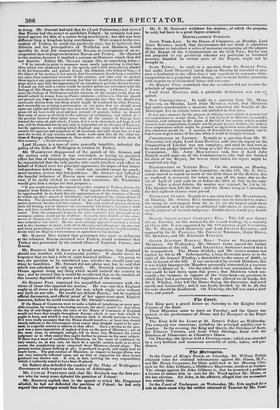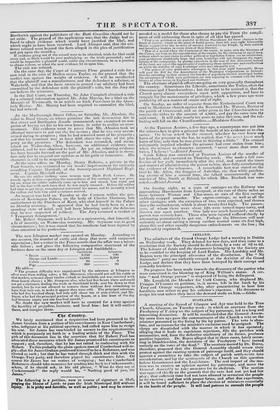Abe Sitetropono.
In the Court of King's Bench, on Saturday, Sir William Follett obtained rules for criminal informations against Mr. Hume, M.P., and Mr. Henry Carpenter, for libels published in the Morning Chro- nicle on Sir John Gibbons, a Middlesex Magistrate, resident at Staines. The charge against Sir John Gibbons is, that he promised a publican a licence to induce him to vote for Mr. Wood against Mr. Hume, at the last election. Sir John, in his affidavit, alleged that the accusation was utterly fidse.
In the Court of Exchequer, on Wednesday, Mr. Erle applied for a
rule to show cause why the verdict obtained at Taunton by Mr. Peter Borthwick against the publishers of the Bath Guardian should not be set aside. The ground of the application was, that the Judge had re- fused to admit evidence which would have justified the libel, and which ought to have been received. Lord Abinger said, that the evi- dence refused went beyond the facts alleged in the plea of justification and put upon the record— If evidence going out of the accord were to be admitted, trials for libel could never end, as libels would be ever multiplying us the trials proceeded ; and it would be impossible a plaintiff could, under any circumstances, be in a position to obtain redress, or rebut the new evidence let in upon him.
The rule was refused.
On the same day, the Court of Common Pleas granted a rule for a new trial in the case of Mellen versus Taylor, on the ground that the verdict was against the weight of evidence. It will be recollected that the plaintiff was a manufacturer, and the defendant a solicitor, at Wakefield, and that the facts sworn to proved klet adultery had been committed by the defendant with the plaintiff's wife, but the Jury did not believe the witnesses.
In the Bail Court, on Thursday, Sir John Campbell obtained a rule for a criminal information against Mr. John Murray, for a libel on the Marquis of Westmeath, in an article on Irish Poor-laws in the Quar- terly Review. Mr. Murray had been required to contradict the libel, but had refused.



























 Previous page
Previous page